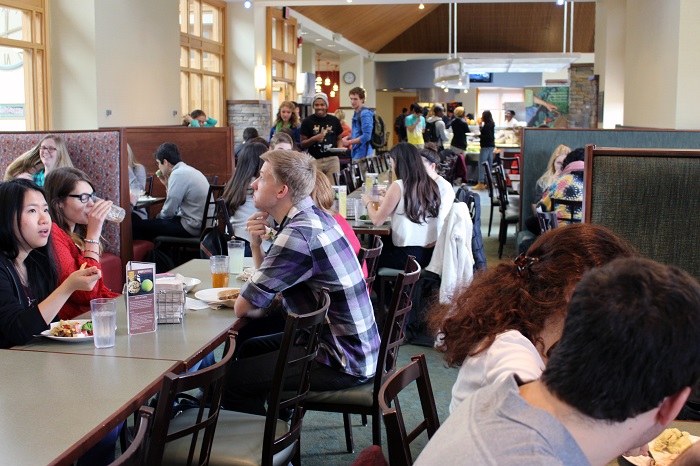In an effort to address scheduling concerns expressed by students and professors, a new schedule has been proposed by a committee consisting of the Provost, Registrar, Associate Registrar and Director of Institutional Research, in hopes of changing the schedule structure for the 2019-2020 school year.
Provost Abu Rizvi explained that the goal behind the new schedule is to increase flexibility for students and professors and improve student wellness and decrease stress levels. Rizvi said the new schedule will ensure that classes do not overlap the lunch hour on Tuesdays and Thursdays, meaning that students won’t have to choose between getting to class on time and eating three meals a day.
The draft proposal leaves 12 to 1 p.m. free of classes on Tuesdays and Thursdays, with some exceptions for classes 11 a.m. to 12:15 p.m. Classes can be scheduled from 12:05 to 12:55 p.m. on Mondays, Wednesdays and Fridays.
Registrar Frank Benginia said classes would be scheduled so that students would never be required to take classes back to back before, during or after this hour. “Our preliminary modeling shows approximately 10% of our classes [would meet] at 12:05 [p.m.] on the MWF sequence,” Benginia said.
Rizvi said that this would make lunch more manageable for both students and dining staff. Students scheduled for class during this block would eat either before or after class, resulting in fewer people using dining facilities at a time midday. Benginia wrote in an email that this is a concern that needs “to be addressed regardless of the size of the college.”
Annette Diorio, Vice President of Campus Life, sees the new schedule as a way to “alleviate some of the congestion when everyone is trying to eat between 12:20 and 12:40 [p.m.], which seems the main crunch time now.”
Diorio explained that when Lafayette chose a new dining provider a few years back, they chose Bon Appetit with the knowledge that the food would be fresher, but the lines would be longer.
“The small batch prep process was described as increasing wait times but during the selection process students were pretty vocal about wanting fresher food, so that was a trade off that we made when we changed providers,” Diorio wrote in an email.
Another change in this proposal is extending the period in between classes from 10 to 15 minutes in the hopes of cutting down students’ stress of always moving from place to place, as well as facilitating movement between main campus and the arts campus down the hill.
“We know that when some classes are taught down [the hill] they get lower enrollment than the same classes taught in Pardee Hall,” Rizvi said.
By adding a few minutes between classes and better syncing shuttle runs with the class schedule, a project which Director of Arts Jennifer Kelly and Diorio have been working on, the Provost hopes to see students more willing to take classes in the arts campus.
Kelly wrote in an email that they are working on “making it easier for students to take classes that are offered at times other than block schedule, when they may need to travel up and down the hill more quickly.” She added that the new schedule will “certainly help,” and also suggested that offering dining options down the hill would help make the new schedule feasible.
When asked about offering more dining hours and options for student down the hill, Vice President of Finance and Administration Roger Demareski said that the college is “still working on concepts for the SPOT and hope[s] to have a recommendation soon.”
The new schedule is also intended to increase flexibility for class structures. Early morning classes could start as late as 8:25 a.m. within the first class block, and could end as early as 3:30 in the last one. Professors can give exams in 50-minute classes without making students late to their next classes. More importantly, things like study sessions, reviewing test answers or workshops could happen before or after class, but still within the class block.
The proposal was recently brought to the student government and President Connor Burwell ‘19 explained that overall reactions were positive. Student government members posed logistical questions that he felt Provost Rizvi answered in detail, assuaging concerns. He added that he felt the process is extremely transparent and the Provost is doing his due diligence to get real feedback from students.
As a graduating senior, Burwell said, “Honestly, I wish that I could take courses under this schedule.”


















































































































